If you love creating handmade goods and want to sell them online, you've probably heard of Etsy.
Etsy is an online marketplace where you can sell handmade or vintage goods and craft supplies. It's been around since 2005 and has grown into a massive platform with millions of users.
However, as we enter 2024, it's worth asking the question: Is it still worth selling on Etsy?
After careful consideration and research, my conclusion is that it's not worth it to sell on Etsy in 2024.
But where is a better place to sell?
One of the best eCommerce platforms is Shopify, and that's why I recommend switching from Etsy to Shopify or Wix to sell your handmade goods, and I will tell you why!
Why it’s not worth it to sell on Etsy in 2024
Beautiful, simple reviews for your site
Easily collect, show & grow customer reviews, photos & videos for your business.Let’s go through each of them!
Transaction and Listing Fees
What are Etsy Transaction Fees?
Etsy transaction fees are the fees that Etsy sellers must pay for the pleasure of selling their goods on the Etsy platform.
In addition to the mandatory listing fee of $0.20 USD, there is an Etsy Payment fee of 6.5%. Etsy recently increased its transaction fee from 5% to 6.5%.
That’s a 30% increase!
This fee is charged on the total amount of each transaction, meaning that if you sell a product for $100 USD, Etsy will take $6.5 USD from the sale.
When you add up all of the fees, the minimum commission you'll give Etsy on a $100 sale is $6.70 USD.
You may think that isn’t too bad, and if that were all the fees Etsy charged, you’d be right! But those aren’t all the fees that Etsy has.
Etsy sellers can pay all types of fees like:
- Advertising and Promotional Fees
- Etsy Ads Fees
- Offsite Ads Fees
- Subscription Fees
- In-Person Selling Fees
- Payment Processing Fees
- Delivery Fees
- Regulatory Operating Fees
- Pattern Fees
- Currency Conversion
That’s a lot of fees!
‘Forced’ Free Shipping
Lately, Etsy has been pushing sellers to offer free shipping.
And we all know shipping isn’t free.
Etsy's push for free shipping has been a controversial issue among sellers. While offering free shipping can attract more customers and increase sales, it can also be difficult for small businesses to absorb the cost.
Shipping fees for heavier or more fragile items like ceramics and candles can be expensive. If you, as a seller, have yet to price your products to cover these costs, you may lose money on each sale.
The requirement to offer free or super fast shipping puts small businesses at a disadvantage, as most of us don’t have the resources to offer free shipping like larger retailers.
Ultimately, while offering free shipping may benefit some sellers, expecting all sellers to do so is unreasonable. It feels like Etsy doesn’t consider this when implementing such policies.
That’s why Etsy just isn’t it in 2024.

Can’t Brand Properly
Another issue with Etsy is that you can't really brand your store.
Sure, you can create a shop banner and logo, but ultimately, you still operate within the Etsy platform. This means that you have less control over your brand than you would with your own website.
And let’s face it, when customers shop on Etsy, they're shopping on Etsy – not necessarily with you.
There are always other shops that Etsy makes visible when someone is on your product page, making it harder to create a loyal customer base.
This brings me to my next point.
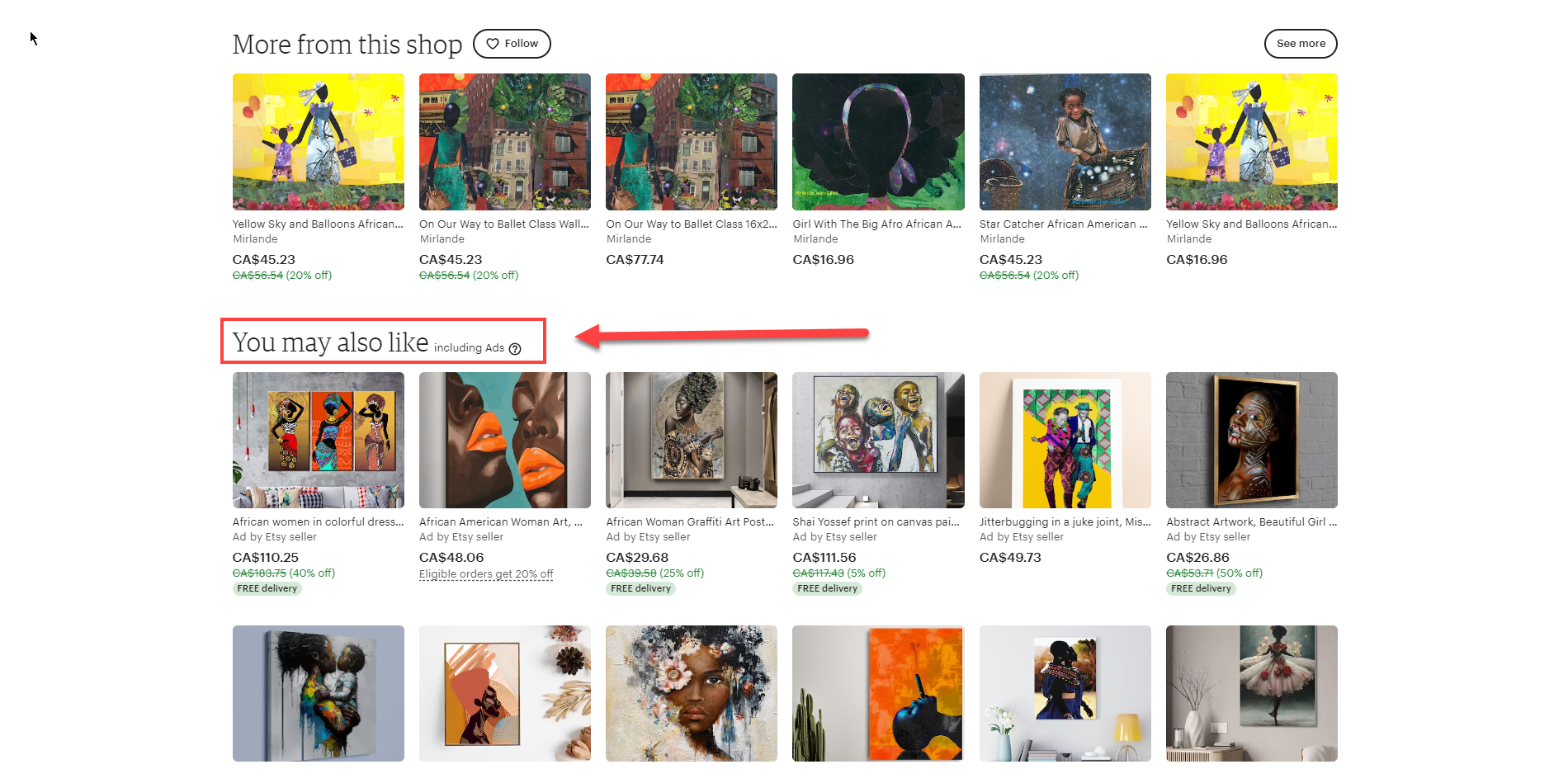
You Don’t Own Your Customer Base
Perhaps one of the biggest drawbacks of selling on Etsy is that you don't own your customer.
Now, what does owning your customer mean?
It means you can communicate with them anytime because you have their contact information.
That’s not the case on Etsy.
When someone makes a purchase on Etsy, the platform owns their data. You can't contact customers directly or build your email list.
If you want to market to your customers, you must do it through Etsy's messaging system, which isn't ideal.
Just check out all the advertising fees I listed above for you!
Harder To Grow Your Email List
Speaking of email lists, it's also more work to grow your email list on Etsy.
Since you don't own your customer data, you can't use it to build your email list.
This means that even if you have repeat customers who make multiple purchases from your shop, you can’t give them the option to be on your email list when they order. You have to find other ways for them to opt in, which isn’t easy!
This lack of control over customer data can be frustrating for sellers who want to build long-term relationships with their customers.
When you use Etsy, you need to consider other marketing strategies outside of the platform to build a loyal customer base and build a community around your brand like:
- Social media
- Creating valuable blog content
- Promotions or incentives for signing up for your email list
When you move to Shopify or Wix, you can use pop-up forms and on-site contests to collect email addresses!
Loads of Competition, Copycats, and Manufactures
One of the biggest challenges of selling on Etsy is competition.
There are thousands of sellers on the platform, many of whom are selling similar items to what you're offering. This means you're constantly competing for visibility and sales from other handmade items.
Because many people have the same skills as you, there's the issue of copycats. Since anyone can create an Etsy shop and start selling similar items, it's easy for others to copy your designs and undercut your prices.
But the worst part is when manufacturers from China steal your ideas and sell them on Etsy.
Not only do they sell the exact same item, but they also sell it for less!
When you have ‘similar items’ right below your listing, it makes it easy for shoppers to ditch your store and go for a dupe.
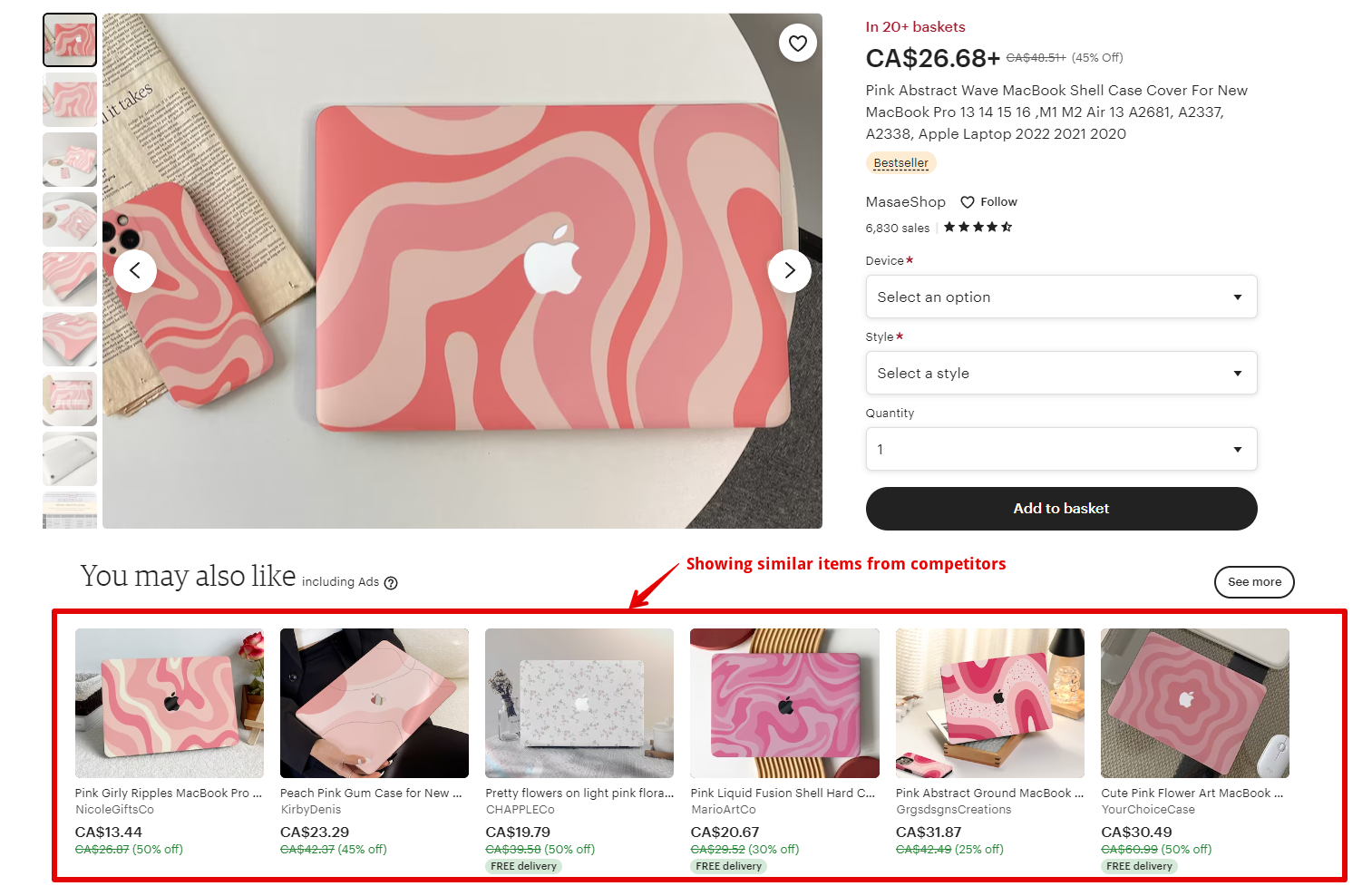
Cannot Scale
Another downside to selling on Etsy is that it can take time to scale your business.
While you might start selling a few items here and there, it's hard to grow beyond that. Because of the fees and competition, it's hard to justify expansion.
This can be frustrating if you want to grow your business over time.
While platforms like Shopify or Wix have hundreds of apps like top review apps to choose from that can save you either time or help you make more sales, Etsy simply doesn’t have that!
The lack of apps on the Etsy platform stops you from automating your business, which can help you scale faster.
Less Credibility as an Etsy Store
Etsy's credibility as an e-commerce platform has been a topic of debate among sellers and customers alike.
While Etsy has been around since 2005 and has over 7.5 million active sellers as of writing this post, it can still be seen as less professional than other platforms like Amazon or independent websites built on Shopify or Wix.
This lack of credibility can be a turn-off for potential customers looking for a more established and reliable platform to shop from.
Not only that, but Etsy's reputation has been tarnished in recent years by issues such as copycat products, fake reviews, and seller scams.
While Etsy has taken steps to address these issues, they can still affect the platform's perception among customers, hurting you as a seller.
This lack of credibility can also make it harder for sellers to establish their brand and stand out from the competition. Customers may be less likely to trust a new or unknown seller on Etsy, making it harder to drive sales and build a loyal customer base.
Overall, while Etsy has its strengths as a platform for selling handmade and unique products, its credibility can be a challenge if you are looking to build a professional and trustworthy brand.
By considering other e-commerce platforms with higher levels of trust and reputation, you can attract more customers and build a stronger business in the long run.
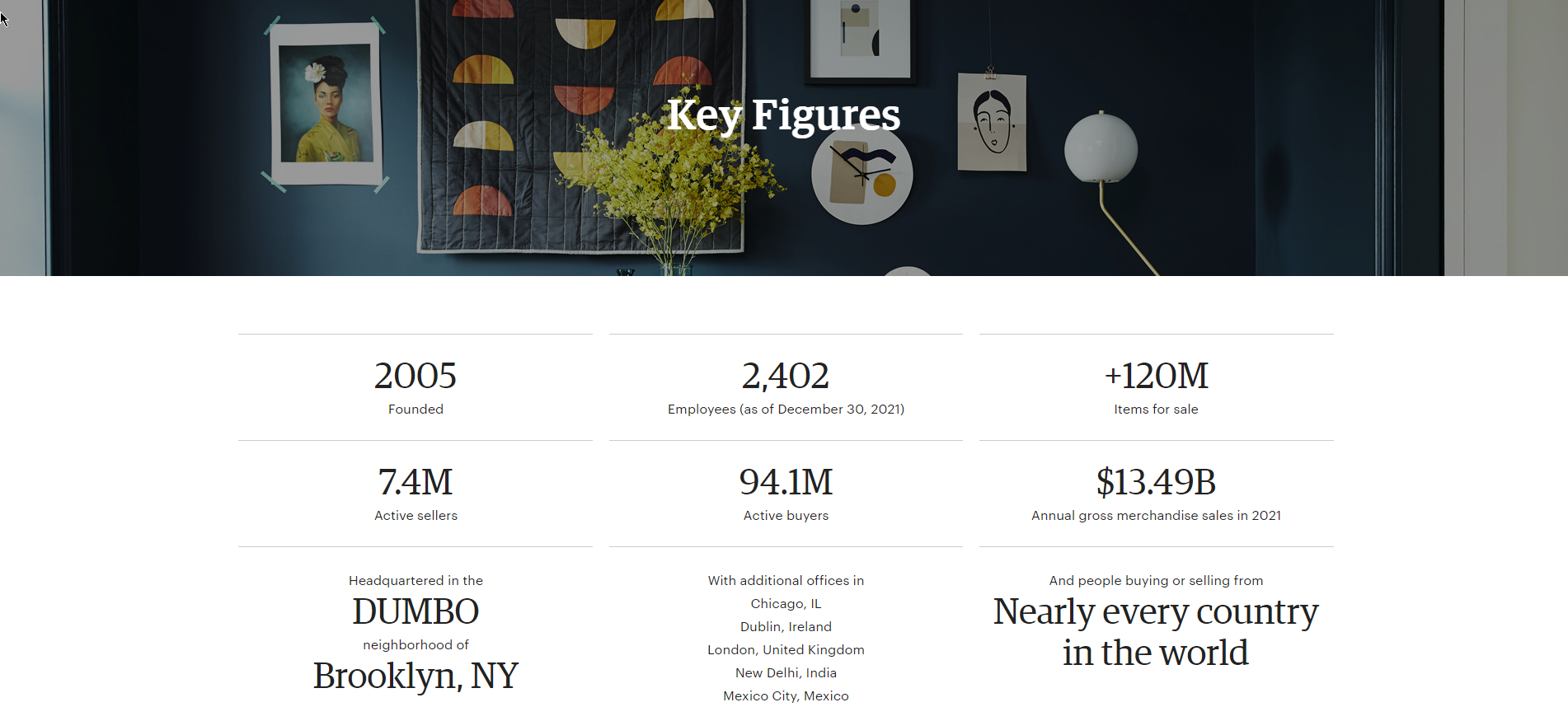
Difficult To Rank In Search
Etsy Search
One of the biggest challenges for sellers on Etsy is the difficulty in getting products to appear prominently in search results.
Etsy has its own search algorithm that considers factors such as relevance, quality, and customer satisfaction.
However, the algorithm can be opaque and difficult to understand, making it hard for you to optimize your listings for search.
The Etsy search algorithm can feel like a black box and a waste of time to try to make your listing better!
Because of this, many Etsy sellers don’t feel confident in optimizing their listings for search.
This can be a significant challenge if you’re trying to attract new customers and grow your business. Without a strong presence in search results, getting the visibility and sales, you need to succeed on Etsy can be hard.
Additionally, Etsy's search algorithm can be impacted by factors outside of your control, such as the level of competition for their product category or changes to Etsy's search algorithm.
This means that even if you optimize your listings, you may still struggle to rank well in search results.
Overall, the challenges of ranking in Etsy's search algorithm can make it difficult for you to attract new customers and build a successful business on the platform.
By considering other e-commerce platforms with more transparent and predictable search algorithms, you can probably achieve greater visibility and success in your online sales!
This brings me to why Etsy isn’t the place to be in 2024!
Google Search
It's worth noting that for online sellers, ranking well in search engines like Google is often even more important than ranking well on Etsy's search algorithm.
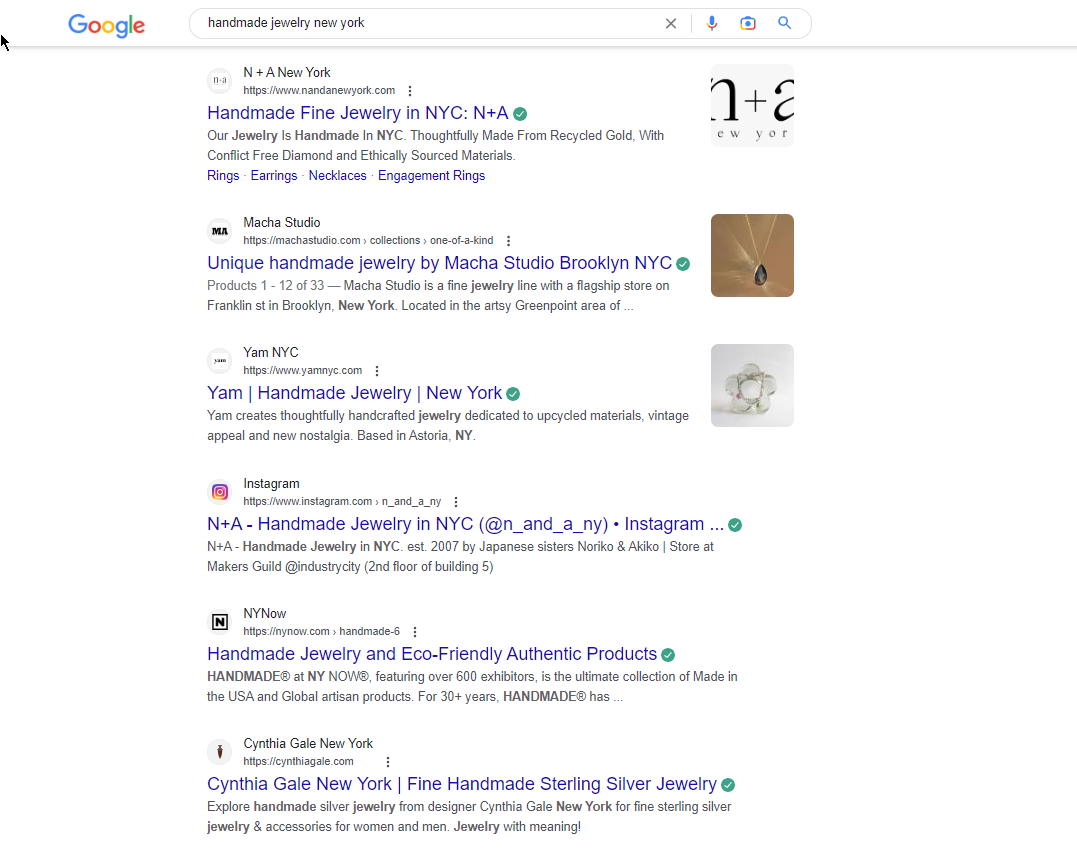
While Etsy's algorithm determines how visible a seller's products are within the Etsy marketplace, Google search determines how visible a seller's website is to the internet.
This is where platforms like Wix and Shopify can offer you significant advantages over Etsy.
Both Wix and Shopify are designed to help merchants build their own standalone websites, which can be optimized for search engines like Google.
These platforms offer amazing Search Engine Optimization (SEO) tools and integrations that can help you rank well in Google search results, which can drive significantly more traffic and sales than relying solely on Etsy's search algorithm.
For example, according to Barn2, Shopify ranked second only to WordPress in terms of the number of websites that use the platform.
This widespread adoption can make it easier for all Shopify merchants to achieve strong search rankings.
Why?
Google tends to favor well-established and popular websites, so more stand-alone Shopify stores mean a better ranking for all Shopify stores!
Wix has also invested heavily in its SEO capabilities, with features like Wix SEO Wiz that guide you through optimizing your website for search engines.
This focus on SEO has paid off, with Wix ranking as the world's fourth most popular eCommerce website builder.
Overall, ranking well in Google searches is critical if you’re looking to build a successful online business.
While Etsy's search algorithm can be important for visibility within the Etsy marketplace, platforms like Wix and Shopify offer greater flexibility and control over SEO, which can drive significant traffic and sales to your website.
The Star Seller Program Sucks
One aspect of Etsy that's worth mentioning is the Star Seller Program.
This program is supposed to reward sellers who provide great customer service and have high sales volume.
However, many sellers have complained that the program is unfair and non-transparent.
Some sellers have even reported being kicked out of the program without explanation, which can significantly impact their sales.
Not only that but having to be available every day as a small business owner is super stressful.
When you have your own store, you can set your own policies and collect your own reviews through a review app like Fera.
You can also move all your Etsy reviews to your Shopify or Wix store using Fera, so you don’t lose all the valuable feedback you got while on Etsy!
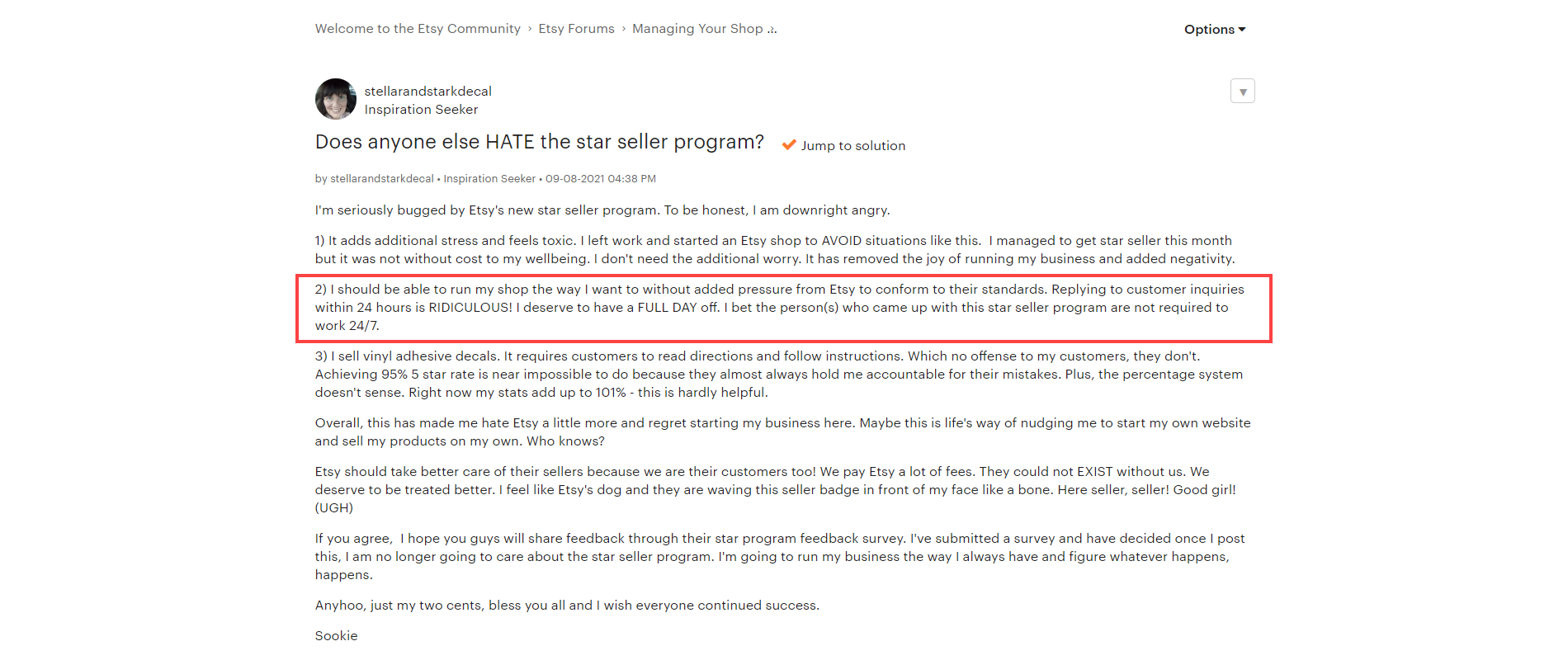
Entirely at the Mercy of Etsy
Finally, one of the most frustrating things about selling on Etsy is that you're completely at the mercy of the platform.
While it's true that this is the case with any third-party platform, it's especially true with Etsy. If Etsy decides to change its policies or algorithms, it can majorly impact your business.
Additionally, if Etsy were to shut down tomorrow, you'd be out of luck – you wouldn't have any way to contact your customers or continue selling your products.
What are some Etsy alternatives?
So, with all of these drawbacks of Etsy, what's the alternative?
In my opinion, the best option is to switch to either Wix or Shopify.
Both of these platforms offer a plethora of benefits that Etsy simply can't match.
Beautiful, simple reviews for your site
Easily collect, show & grow customer reviews, photos & videos for your business.Benefits of Moving to Wix or Shopify
1. Get More Control Over Your Brand
First and foremost, both Wix and Shopify offer more control over your brand.
With your own website, you can create a unique look and feel that sets you apart from the competition. You can also use your website to build a loyal customer base and grow your email list – things that are much harder to do on Etsy.
2. Scale Your Handmade Business
Another advantage of Wix and Shopify is that they offer more scalability.
With your own website, you have more control over your pricing, which means that you can adjust your profit margins to reflect your business needs better. Additionally, both Wix and Shopify offer a range of features that can help you grow your business over time.
For example, Shopify has an app store offering a range of marketing tools, shipping apps, and more!
3. Avoid Excessive Fees
When it comes to fees, Wix and Shopify are also more affordable than Etsy in the long run.
While there are fees associated with running your own website, these fees are generally lower than Etsy's transaction and listing fees.
Additionally, both Wix and Shopify offer a range of pricing plans, so you can choose the best option for your budget.
4. Own Your Customer Data
Finally, both Wix and Shopify offer more control over your customer base.
With your own website, you own your customer data, meaning you can contact customers directly and build your email list.
Additionally, you don't have to worry about Etsy's search algorithm or policies – you're in control of your own destiny!
Wrapping Up
In conclusion, while Etsy has been a popular platform for selling handmade goods for many years, I believe that it's no longer worth it to sell on Etsy in 2024.
The fees, competition, and lack of control over your brand and customer base make it difficult to build a sustainable business.
Instead, I recommend switching to either Wix or Shopify, both of which offer more control and scalability over your online store.
With your own website, you can build a unique brand, grow your customer base, and take your business to the next level.









